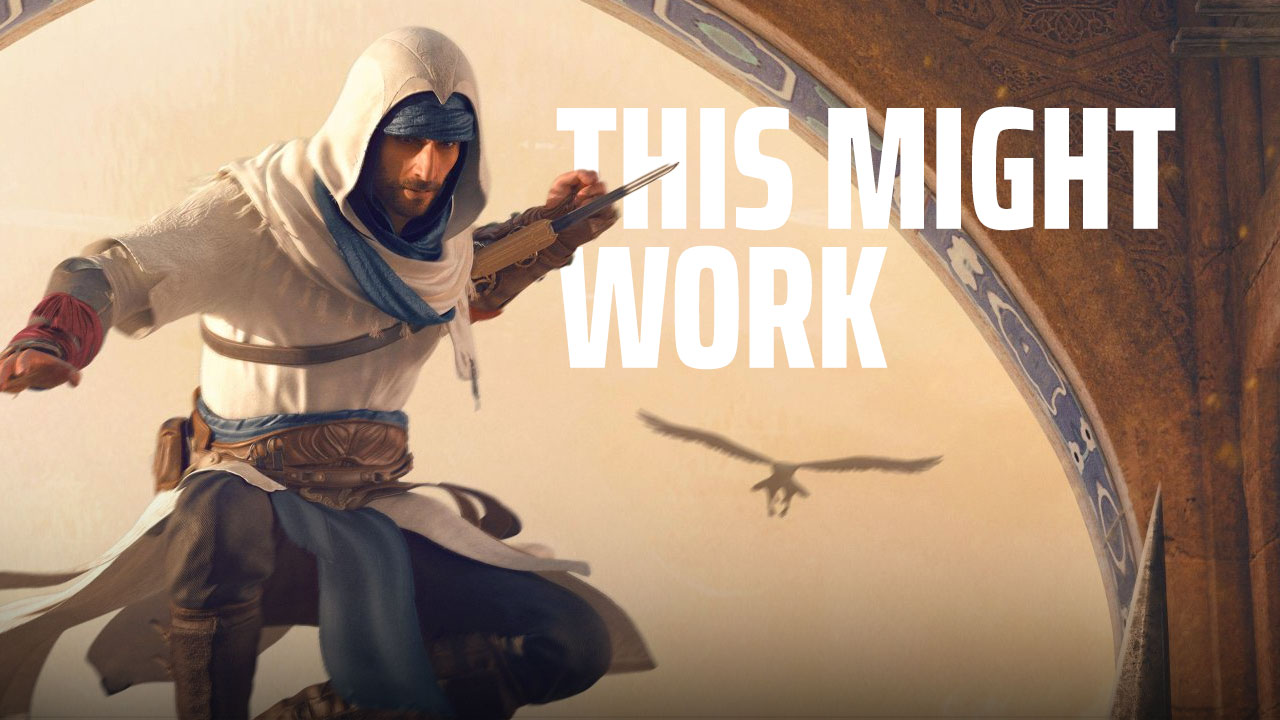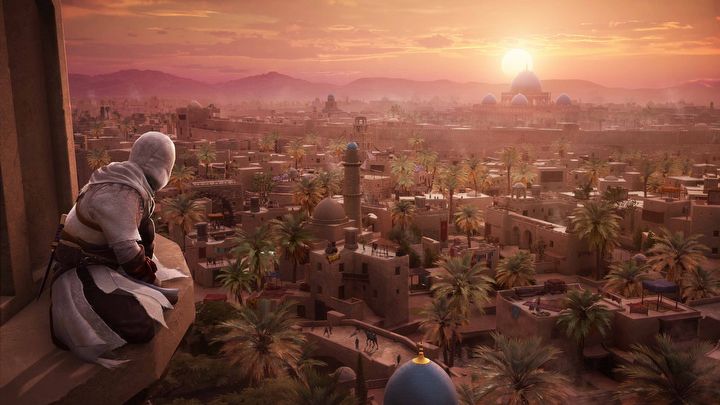Assassins' Creed Mirage May Return This Series to Grace
I've played Assassin’s Creed Mirage and though it's hard to give a definite opinion just now, it seems that Ubisoft is really trying to take us back to the moments that started the entire adventure of Desmond Miles.

After two or three installments that may have seemed spread too thin, Assassin's Creed decided to bring back the splendor of its former glory – playing the role of a stealthy warrior who traverses the rooftops of a sprawling, beautiful city. I've played Assassin's Creed Mirage, and while it's hard for me to judge yet, it seems that Ubisoft is at least trying to take us back to the sensations we remember from the first adventures of Desmond Miles. The new Assassin's Creed is an attempt to combine the old with the new – instead of extended, but superficial realms – a single city. I am pleased with this "turning back to locality," even if it only is apparent – maybe it'll be possible to crystalize the series that in recent years has, in my opinion, lost its identity.
Because it's all about identity. After Assassin's Creed Valhalla, I was so tired of Assassin that the series began to remind me of everything that was wrong in gamedev: homage to mediocrity and skimpiness, poor and repetitive gameplay, and finally the shallowness of both the characters and the story. In my opinion, the series has long suffered from anemia – it's become colorless, safe to the point of being horribly boring.
I believe that my feelings stem from the pivot the series made with the release of Assassin's Creed Origins. Since then, the next Assassins offered us vast worlds with immense possibilities and... less and less engaging stories. As much as I enjoyed Origins, both Odyssey and Valhalla were overall uninspired experiences in which the concept from Origins was stretched thin to the point of absurdity. Spread out installments with hollow emotions and acting worse than my singing. And believe me, I sing terribly. This vastness and pursuit of an open world was at the same time the thing that pushed the series into the shoals of mediocrity.
That's why I was very excited to see this heralded "return to roots" in Assassin's Creed Mirage. I can't yet say with full confidence that it'll be better but I can probably say that it'll be more "local" and "concrete."
Basin of Baghdad
During the game, I took care of completing mostly the main quests, and here I found the first pleasant surprise: at least in two major quests, the story involved the Brotherhood of Assassins (The Hidden Ones) and the Order of the Ancients (the protoplasts of the Templar Order). It's hard to guess whether the entire story of the game will orbit around these societies, but I really hope it will. What absolutely annoyed me in Odyssey and Valhalla was the completely senseless dilution of the story. Instead of a concrete plot about the conflict between two secret organizations, we ended up in the middle of quasi-political and historical conflicts, from which we could try to make any semblance of sense – if we wanted to try.
Somewhere in all that squabbles about Spartans, Greeks, Anglo-Saxons, and Vikings, the stories of Cassandra and Eivor seemed insignificant. This time, however, at least judging by the fragment of the game shared with me, the plot and action of the title seemed to be much more specific. Basin is the Hidden One (Assassin) and in both quests that I tried, his opponents were members of the Order of the Ancients (Templars).
As far as cutscenes and dialogues are concerned... well, it's not Cyberpunk, but what I saw was done well and I didn't feel like the people expressing their emotions were trying to sell me something anymore. The series actually has had a problem with this since its beginnings, but the lowness of drama that the developers reached in the last two installments is something I won't forget for the rest of my life – hence I hope that after discarding the quasi-choices, the developers will focus on a good and engaging story. I didn't see a dialogue system – we don't choose any lines, we don't make choices, we just experience the good, old, linear story.
The fragment that was shared with me probably came from the first part of the game, in which Basin takes his first steps as an assassin (the blue emblems on his robes indicated this). During one of the quests, I met Roshan, played by the brilliant Shohreh Aghdashloo, a character you could meet in Assassin's Creed Valhalla.
The tasks were essentially about eliminating particular NPCs associated with the Order, but to reach them, we had to figure out who and where they were. If you played Odyssey or Valhalla, then you certainly remember gathering clues that revealed the identity of the next members of the Order. For this purpose, I had to, for instance, find a letter or eavesdrop on the NPCs' conversation – the old way.
The task screen and the list of order members to be eliminated, known from previous installments, has been replaced by the investigation screen. It's, to simplify, a sort of map of thoughts, in which characters and tasks appear – so, it serves as a quest journal for setting further objectives.
In a nutshell, there won't be a shortage of missions involving the more or less silent elimination of the Order members. I enjoyed the Assassins' hideouts scattered around the map, which you can look into and discover that the Brotherhood of the Hidden is thriving. This is also a place where you can accept contracts for assassinations.
Big Trouble in Baghdad
Interestingly, to keep our misconduct in check, the pursuit system has been redesigned in Assassin's Creed Mirage. If we mess up too much, NPCs can recognize us and call guards, making it difficult for us to remain anonymous and complete a quest. The alertness level of the guards doesn't decrease automatically – we either have to pay to one of the special NPCs or tear wanted posters off the walls.
Speaking of bribing NPCs, in AC Mirage you'll have to pay with special tokens instead of regular currency (dirhams). There are 3 types of tokens in the game and we'll use them, for instance, to recruit thugs to pick a fight with guards or just to pay speakers to whisper a good word about us, thus losing the heat. You can acquire them in several ways, for instance stealing (you can rob basically anyone – it involves a mini-game), doing a favor for the people (small side quests) or completing a contract for the Assassin's Brotherhood. This is an interesting solution, especially since we aren't generously bestowed with these tokens.
The fight itself – because I also checked this aspect – is different from Valhalla or Odyssey. The counterattacking makes a comeback, although the opponents often use attacks that are impossible to block. So they should be avoided, but dodging devours stamina, which depletes incredibly quickly. In the course of 2 hours of play, I died 3 times, although I must admit that due to the time constraints, I didn't play particularly carefully. However, the combat was the least exciting element of the game. Whether it was due to lag (I played the game by streaming) or the fact that my character didn't have more interesting skills.
The stealth returns but don't expect any revolution – we'll use throwing knives, lure opponents with a whistle, blend into the crowd or hide using elements of the environment. However, I had the impression that due to stamina quickly depleting during open combat, the stealth approach might actually make more sense this time. And that's good, because it's Assassin after all, and I missed exactly this element in the series for a while. These quests also required a silent approach, although they often ended in open combat. I wonder if Ubisoft will surprise us with something else besides what I've seen. I really hope it does. For now, it's basically back to the roots all the way, although the emphasis on the silent approach seems slightly greater.
Free running has changed, at least seemingly. It's still as intuitive as in recent Assassin's Creed installments (we overcome all obstacles by pressing a single button on the pad), but there are definitely more walls in Baghdad that aren't suitable for climbing, and thus force us to look for entry points, such as to enter a guarded fortress. This is especially pleasing when climbing viewpoints – these also return, but in the new Assassin, ordinary walls are not suitable for climbing – you have to look for protruding elements on which you can climb up. I have high hopes that this element will be similar to the old AC installments, which required us to think quickly during climbing.
Arabian nights and days
It's been 16 years since we first used the Hidden Blade. Among our readers, there’s probably no shortage of people younger than this franchise. Throughout its existence, we experienced leaps to other eras, remodeling of mechanics, and even a change of genre. However, I’m glad that after the enormous worlds that were created in Valhalla and Odyssey, we can return to the old, but still valid concept. To one city, where – hopefully – interesting stories will unfold revealing the forefathers of Assassins and Templars.
Especially since Baghdad looks beautiful and atmospheric. Sure, it's still the old Assassin's, so it's inhabited by many Ubisoft dolls, but the architecture still makes a tremendous impression.
I hope that if Mirage is really what the developers promise, it'll sell very well, perhaps forcing Ubisoft to reformulate its plans for the series. Because the series could use a reset. It would be helpful to take a few steps back and then use the ruthless, but in my opinion necessary, Occam's razor. But for now – let's wait a little longer. Let's wait, because for now, at least, it looks interesting.

